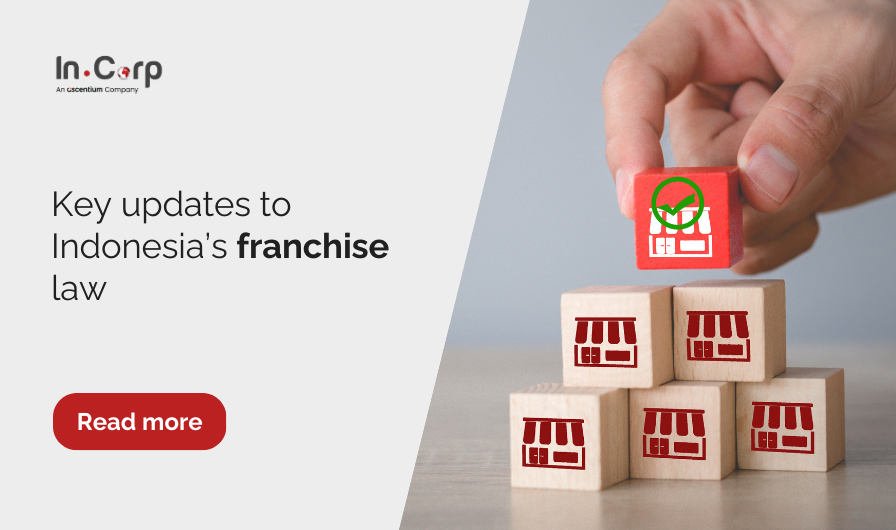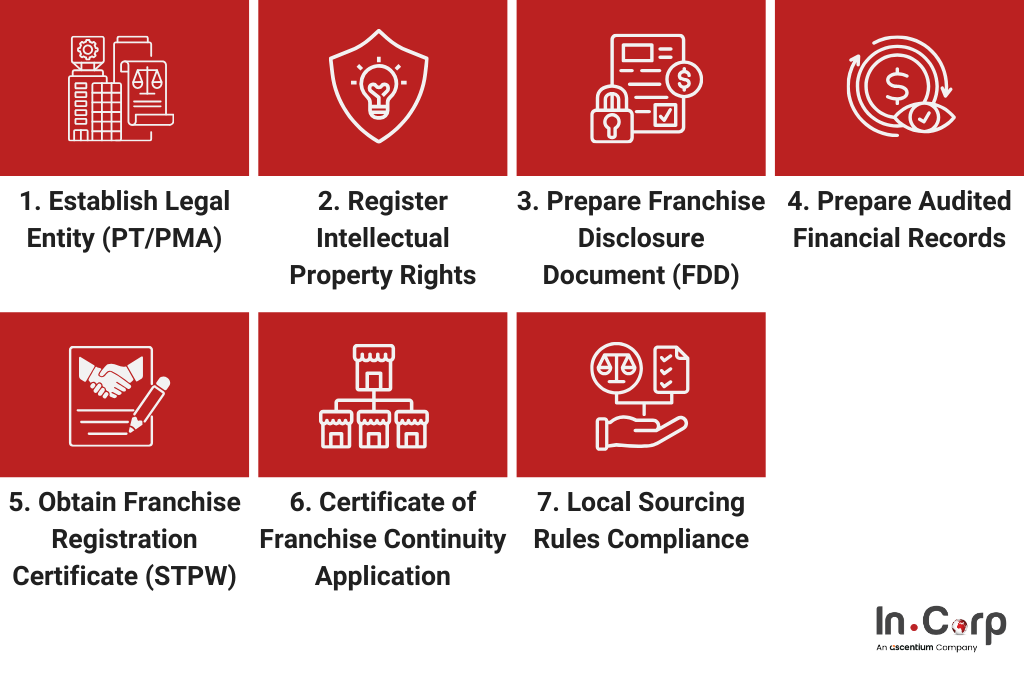Indonesia’s franchise business sector is evolving with the recent regulatory changes to enhance investment potential and ensure compliance. As a local entrepreneur or international investor, understanding and adhering to Indonesia’s franchise law is essential and a key responsibility for a successful business operation.
This article will guide you through the latest franchise regulations and how to smoothly establish a franchise in Indonesia.
Understanding franchise business
A franchise business is a system in which a franchisor grants a franchisee the right to use its brand, business model, and operational system in exchange for fees and royalties. This model allows businesses to expand efficiently while maintaining brand consistency.
The franchisor, as the business owner, will provide comprehensive support, training, and guidelines to the franchisee, who, in turn, agrees to follow the established franchisor’s business practices. This mutual agreement ensures a strong foundation for the franchise business.
The new regulations for franchise business in Indonesia
Franchising in Indonesia was previously governed by Government Regulation No. 42 of 2007 on Franchising (GR 42/2007) and Ministry of Trade Regulation No. 71 of 2019.
However, Indonesia introduced GR 35/2024 in September 2024 to enhance the franchise environment. This regulation replaced the old regulation with a simpler process and updated requirements.
Here’s why the Indonesian government revised its franchise business regulations:
- Reducing administrative burdens for franchisors and franchisees.
- Attracting foreign investment with more explicit legal requirements.
- Strengthening consumer protection.
- Ensuring fair competition.
- Adapting to global market trends.
Key updates under GR 35/2004
The introduction of GR 35/2024 marks a significant change in Indonesia’s franchise business regulations. Below is the breakdown of the key updates under the new rules:
Franchise Organizers Categories
Under GR 35/2024, the definition of Franchise Organizers has been expanded, which previously included only Franchisors and Franchisees. Now, both domestic and foreign businesses can fall into additional categories:
- Franchisors: Businesses or individuals that grant franchise rights to others.
- Franchisees: Those who receive the rights to operate a franchise from a franchisor.
- Master franchisors: Franchisees who have the authority to appoint additional franchisees.
- Sub-franchisees: Those who receive franchise rights from a Master Franchisor rather than directly from the original franchisor.
Franchise business criteria
A business must meet updated criteria to be recognized as a franchise under GR 35/2024. This ensures that the franchise model is aligned with current standards and practices.
Business system
A franchise business requires a well-defined structure encompassing key areas such as operations, management, marketing, and employee guidelines. This clear framework is essential for franchisees, providing them with the protocols and standards to ensure consistent quality and efficiency across the franchise network.
Proven profitability
For a franchise business to qualify, it must have been in operation for at least three years and provide two years’ worth of audited financial reports that demonstrate consistent revenue. However, Micro, Small, and Medium Enterprises (MSMEs) are exempt from this requirement.
Registered intellectual property
For a franchise to thrive, it is essential to ensure legal protection for its brand. This can be achieved through various mechanisms such as trademarks, copyrights, patents, and trade secrets. These protections safeguard the franchise’s intellectual property and help maintain its unique identity in a competitive market.
Ongoing franchisor support
Franchisors play a crucial role in the success of their franchisees by providing ongoing support in several key areas. Continuous assistance in training, marketing, research, and operational guidance is essential for fostering business growth and ensuring that franchisees can thrive in a competitive environment.
Franchise prospectus offer
GR 35/2024 requires franchisors and master franchisors to provide a Franchise Prospectus to potential franchisees at least 14 days before signing the franchise agreement. The prospectus should contain:
- Franchisor information: Business identity and legal status.
- Business background: Company history and structure.
- Franchise system: Operational guidelines and business model.
- Financial reports: Audited statements from the last two years.
- Franchise network: Number of existing franchise outlets.
- Franchisee list: Names of current franchisees (not required for new franchises).
- Rights & responsibilities: Obligations of both the franchisor and franchisee.
- Intellectual property: Trademark and copyright registration details.
Franchise registration letters (Surat Tanda Pendaftaran Waralaba / STPW)
All franchise businesses must have a Franchise Registration Letter (STPW) as a business license for their operations. Foreign franchisors require a legalized business license from their home country and a franchise continuity certificate issued by the Indonesian Embassy or Trade.
Failure to comply may lead to fines or other administrative penalties under Government Regulation No. 5 of 2021.
Franchise logos
Under GR 35/2024, all Franchise Organizers must display an official franchise logo issued by the Minister of Trade after obtaining their STPW. This logo must be placed in all franchise branches and headquarters for public visibility. However, foreign franchisors are exempt from this rule.
Read more: Franchise Agreement and Business in Indonesia.
Requirements to set up a Franchise in Indonesia
Expanding a franchise business in Indonesia requires careful planning and compliance with local regulations. Below are the key requirements to establish a successful franchise in Indonesia:
1. Establish a legal entity
Foreign franchisors typically set up a foreign-owned limited liability company (PT PMA), while local franchisees can establish a PT company.
2. Register intellectual property rights
Trademarks and other IP rights must be registered with the Ministry of Trade before applying for an STPW via the Online Single Submission (OSS) System.
3. Prepare a Franchise Disclosure Document (FDD)
Provide detailed information about the franchisor’s business model and operations, written in Bahasa, to ensure transparency.
4. Prepare audited financial records
The franchise must show profitability for at least two consecutive years with certified financial statements.
5. Obtain Franchise Registration Certificate (STPW)
Franchisors must submit the FDD, financial records, and intellectual property documents to apply for an STPW through the OSS System.
6. Apply for a certificate of franchise continuity
Foreign franchisors must obtain this document from the Indonesian Trade Attache or Representative Office in their home country to verify legal operations.
7. Ensure compliance with local sourcing rules
Unless an exemption is granted, businesses must source at least 80% of raw materials, equipment, and merchandise locally.
Read more: A comprehensive guide to trademark registration in Indonesia.
Launch your franchise business in Indonesia with InCorp
Indonesia’s updated franchise laws make expanding businesses easier while ensuring compliance. Following the proper steps, franchisors can enter and grow in this market.
InCorp Indonesia (An Ascentium Company) provides expert support to make the franchise setup process fast and hassle-free. Our comprehensive company registration and licensing services help businesses easily navigate Indonesia’s legal requirements.
Contact us and take advantage of Indonesia’s growing franchise opportunities now.
Get in touch with us.
What you'll get
A prompt response to your inquiry
Knowledge for doing business from local experts
Ongoing support for your business
Disclaimer
The information is provided by PT. Cekindo Business International (“InCorp Indonesia/ we”) for general purpose only and we make no representations or warranties of any kind.
We do not act as an authorized government or non-government provider for official documents and services, which is issued by the Government of the Republic of Indonesia or its appointed officials. We do not promote any official government document or services of the Government of the Republic of Indonesia, including but not limited to, business identifiers, health and welfare assistance programs and benefits, unclaimed tax rebate, electronic travel visa and authorization, passports in this website.




